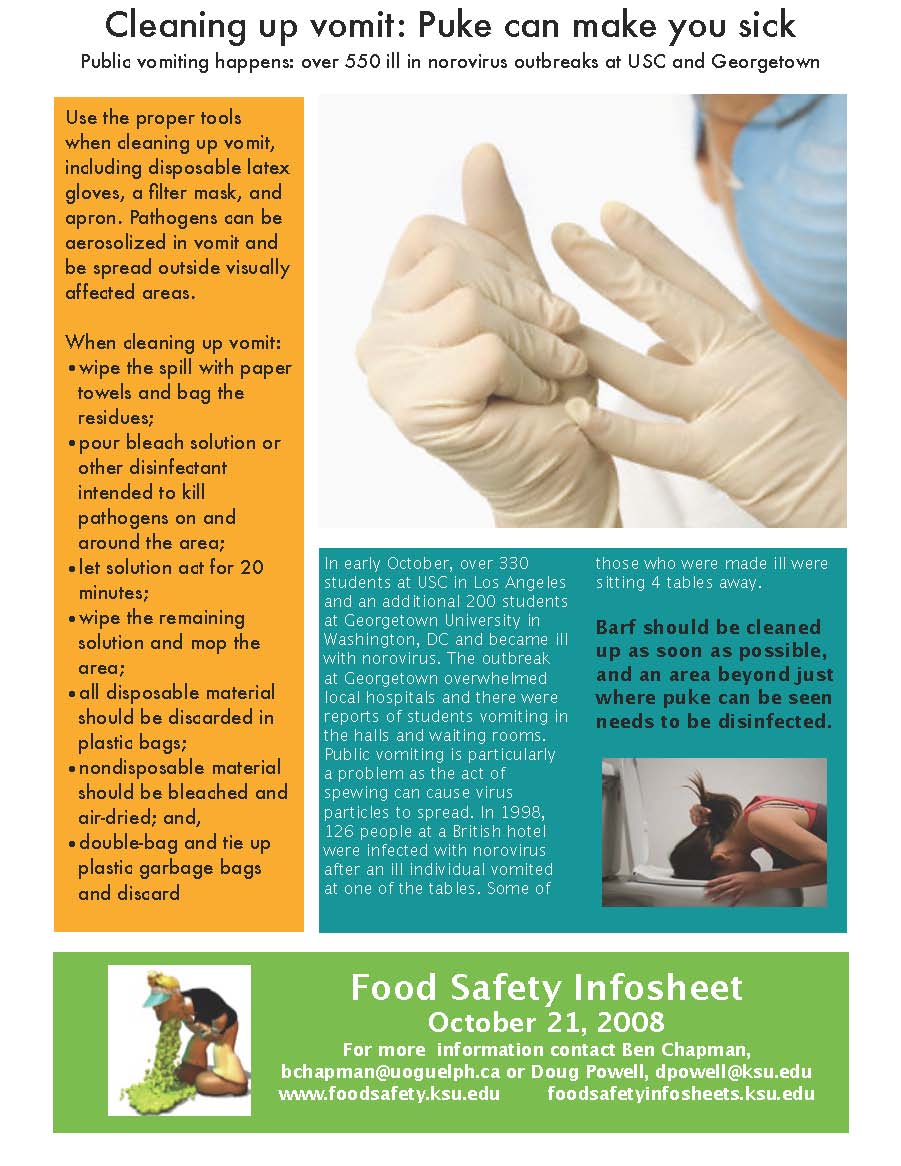Kansas State student Mayra Rivarola writes in this exclusive for barfblog that hospital rooms and doctors became scarce, when 97 students sickened with gastroenteritis crowded the emergency room in Georgetown University Hospital last week. Students who weren’t receiving medical attention began vomiting in the waiting room, according to the Georgetown Voice.
 “I know that some people in the waiting room had been there for three hours. There was a boy yelling ‘help me, help me!’ but there were no doctors,” said Kathrin Verestoun, who went with her roommate to the hospital. “They ran out of rooms and set up stretchers in the hall. Some people were so dehydrated that they couldn’t find their veins for IVs. They were just bleeding. [My roommate] bled all over her stretcher.”
“I know that some people in the waiting room had been there for three hours. There was a boy yelling ‘help me, help me!’ but there were no doctors,” said Kathrin Verestoun, who went with her roommate to the hospital. “They ran out of rooms and set up stretchers in the hall. Some people were so dehydrated that they couldn’t find their veins for IVs. They were just bleeding. [My roommate] bled all over her stretcher.”
The Georgetown students got sick after dining at Leo O’Donovan Cafeteria, which led to a temporary closure of the dining center. They were diagnosed with norovirus and the number of sick people has since risen to more than 200.
The U.S. Centers for Disease Control website states that people can become infected with norovirus by eating food or drinking liquid that is contaminated, by touching contaminated surfaces and subsequently their mouth, or through direct contact with a sick person. The virus is found in vomit or in the stool of an infected person and it is quite contagious.
.jpg) In establishments where a large number of people are in close contact, like cruises, nursing homes and universities, infectious diseases are common.
In establishments where a large number of people are in close contact, like cruises, nursing homes and universities, infectious diseases are common.
At the University of Southern California, it took five days for 300 students to contract norovirus last week. Students were advised to wash their hands often and those who were feeling ill were told to avoid socializing.
Norovirus is not the only disease infecting the classrooms. In Michigan, 34 people got sick with E. coli in September, including 9 students from Michigan State University. Just a month before that, E. coli sickened at least 5 students at Guelph University, with 15 more unconfirmed cases.
Outbreaks happen. So how prepared is Kansas State University?
“I don’t know that anybody is prepared for an outbreak,” said Ron Bridges, campus sanitarian. Food service establishments on campus are inspected monthly by campus staff, and are also inspected annually by the county health department. If there are reports of students getting sick the university may take action depending on the case; officially, the university is not involved.
“Any reported incident of suspected foodborne illness of people who are not related is handled by the Department of Agriculture in the state of Kansas,” Bridges said. The Department of Agriculture then carries on with the investigations.
Bridges said he believes food safety personnel on campus are quite knowledgeable and is confident that they know what they are doing. But some things are just out of their control and outbreaks are hard to prevent.
 About 15 years ago, around 80 students were sick after attending a potluck sponsored by a student organization, Bridges recalled. “If the student organization had wanted to hold the event on campus, the food would’ve had to be regulated,” he said. For this reason, K-State does not approve of any organizations serving food on campus.
About 15 years ago, around 80 students were sick after attending a potluck sponsored by a student organization, Bridges recalled. “If the student organization had wanted to hold the event on campus, the food would’ve had to be regulated,” he said. For this reason, K-State does not approve of any organizations serving food on campus.
How to handle vomit and stop the spread
Vomit and other body fluids are potentially contaminated and can easily spread diseases like norovirus if not properly handled. Spills should be immediately cleaned and the area within 25-foot radius properly disinfected.
At Kansas State University, students and faculty are advised to notify the custodial department immediately and to avoid coming into contact with vomit, according to John Woods, director of Facilities Services.
“Custodians are supposed to be trained to go in and handle vomit,” Woods said. “We will be limiting the number of staff authorized to handle vomit.”
Woods explained that custodians are required to wear gloves, goggles, and a mask. They are supposed to spray the area, wait a few minutes, and scoop the vomit in a plastic bag with paper towels. They turn in the plastic bag to public safety.
